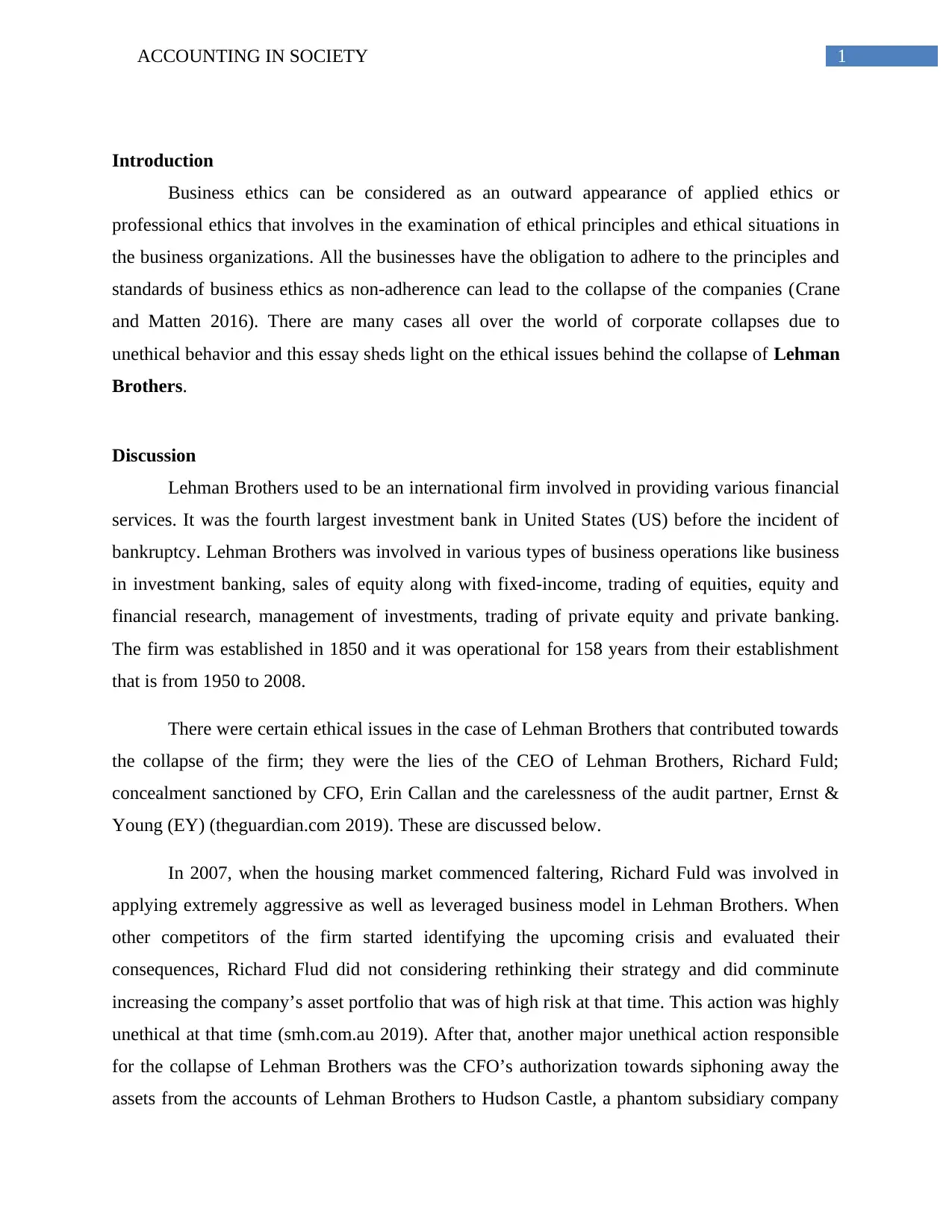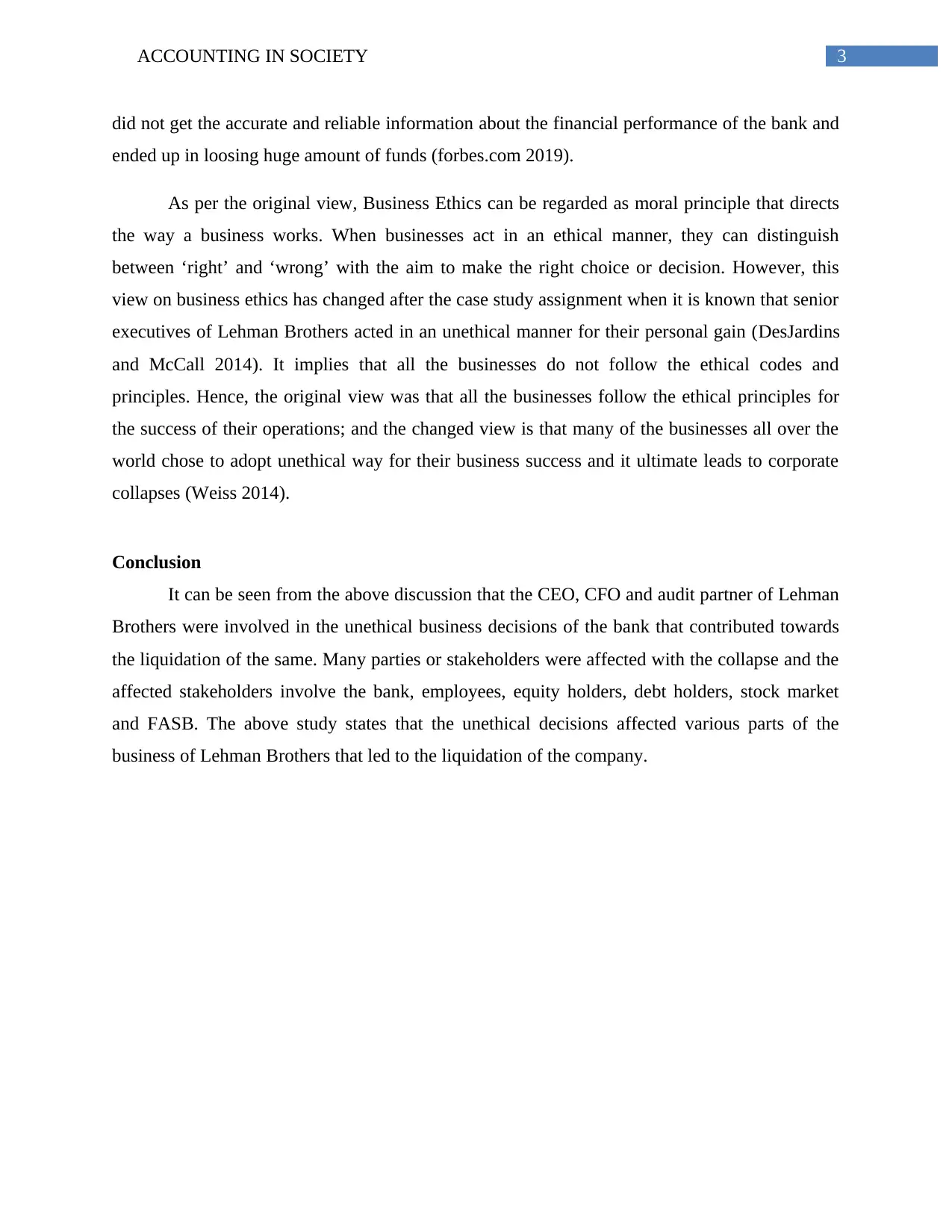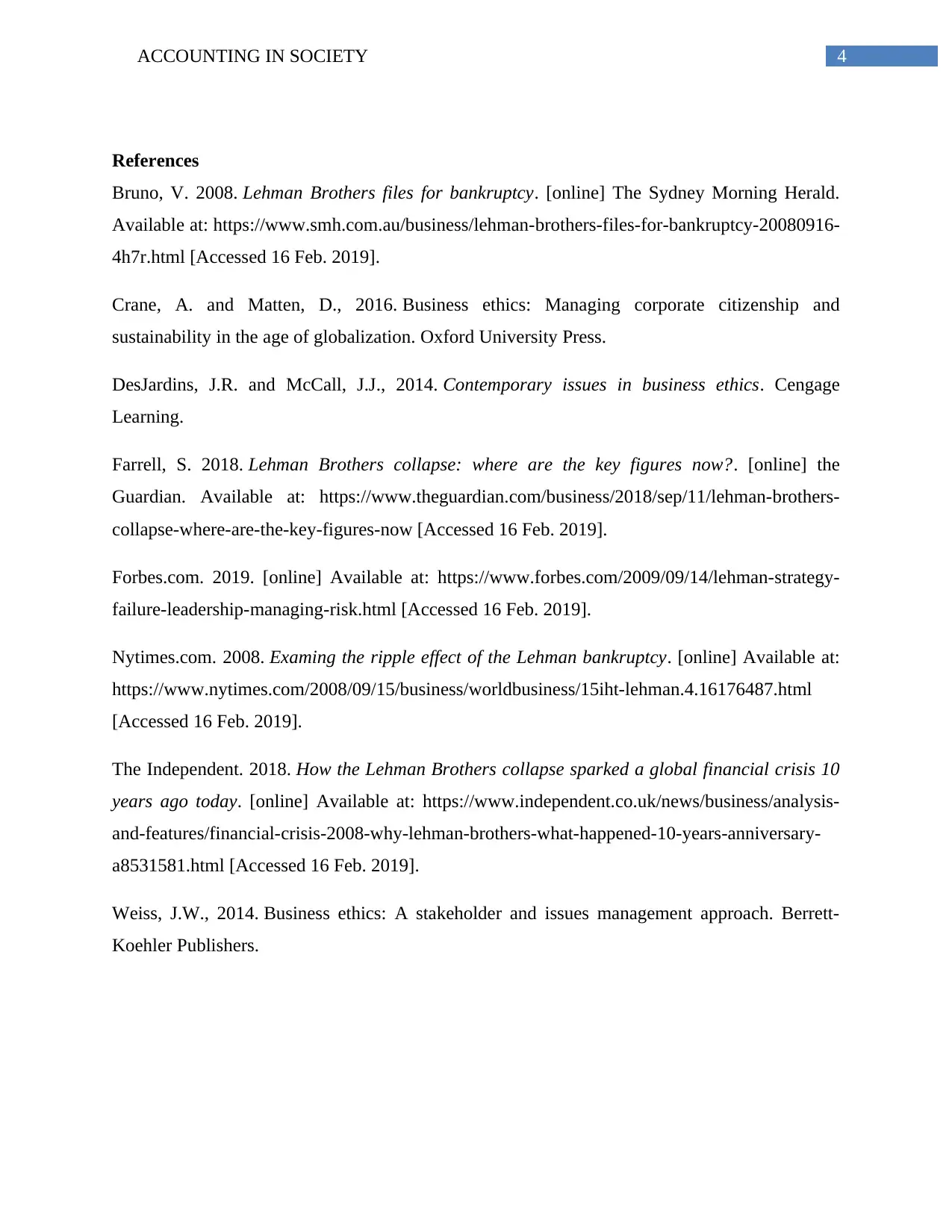WACC100: Accounting in Society - Lehman Brothers Case Analysis
VerifiedAdded on 2023/04/21
|5
|1368
|262
Case Study
AI Summary
This case study examines the ethical issues that contributed to the collapse of Lehman Brothers. The essay explores the actions of key figures like CEO Richard Fuld, CFO Erin Callan, and the audit partner, Ernst & Young (EY), highlighting unethical practices such as aggressive business strategies, the use of Repo 105, and the concealment of financial information. The analysis discusses the impact of these decisions on both primary and secondary stakeholders, including employees, shareholders, and the stock market. The study emphasizes how these ethical lapses, driven by personal gain, ultimately led to the company's liquidation, affecting the financial well-being of many and revealing loopholes in accounting standards. The essay concludes by contrasting the original view of business ethics, where companies adhere to ethical codes, with the changed view that unethical practices can lead to corporate failures.

Running head: ACCOUNTING IN SOCIETY
Accounting in Society
Name of the Student
Name of the University
Author’s Note
Accounting in Society
Name of the Student
Name of the University
Author’s Note
Paraphrase This Document
Need a fresh take? Get an instant paraphrase of this document with our AI Paraphraser

1ACCOUNTING IN SOCIETY
Introduction
Business ethics can be considered as an outward appearance of applied ethics or
professional ethics that involves in the examination of ethical principles and ethical situations in
the business organizations. All the businesses have the obligation to adhere to the principles and
standards of business ethics as non-adherence can lead to the collapse of the companies (Crane
and Matten 2016). There are many cases all over the world of corporate collapses due to
unethical behavior and this essay sheds light on the ethical issues behind the collapse of Lehman
Brothers.
Discussion
Lehman Brothers used to be an international firm involved in providing various financial
services. It was the fourth largest investment bank in United States (US) before the incident of
bankruptcy. Lehman Brothers was involved in various types of business operations like business
in investment banking, sales of equity along with fixed-income, trading of equities, equity and
financial research, management of investments, trading of private equity and private banking.
The firm was established in 1850 and it was operational for 158 years from their establishment
that is from 1950 to 2008.
There were certain ethical issues in the case of Lehman Brothers that contributed towards
the collapse of the firm; they were the lies of the CEO of Lehman Brothers, Richard Fuld;
concealment sanctioned by CFO, Erin Callan and the carelessness of the audit partner, Ernst &
Young (EY) (theguardian.com 2019). These are discussed below.
In 2007, when the housing market commenced faltering, Richard Fuld was involved in
applying extremely aggressive as well as leveraged business model in Lehman Brothers. When
other competitors of the firm started identifying the upcoming crisis and evaluated their
consequences, Richard Flud did not considering rethinking their strategy and did comminute
increasing the company’s asset portfolio that was of high risk at that time. This action was highly
unethical at that time (smh.com.au 2019). After that, another major unethical action responsible
for the collapse of Lehman Brothers was the CFO’s authorization towards siphoning away the
assets from the accounts of Lehman Brothers to Hudson Castle, a phantom subsidiary company
Introduction
Business ethics can be considered as an outward appearance of applied ethics or
professional ethics that involves in the examination of ethical principles and ethical situations in
the business organizations. All the businesses have the obligation to adhere to the principles and
standards of business ethics as non-adherence can lead to the collapse of the companies (Crane
and Matten 2016). There are many cases all over the world of corporate collapses due to
unethical behavior and this essay sheds light on the ethical issues behind the collapse of Lehman
Brothers.
Discussion
Lehman Brothers used to be an international firm involved in providing various financial
services. It was the fourth largest investment bank in United States (US) before the incident of
bankruptcy. Lehman Brothers was involved in various types of business operations like business
in investment banking, sales of equity along with fixed-income, trading of equities, equity and
financial research, management of investments, trading of private equity and private banking.
The firm was established in 1850 and it was operational for 158 years from their establishment
that is from 1950 to 2008.
There were certain ethical issues in the case of Lehman Brothers that contributed towards
the collapse of the firm; they were the lies of the CEO of Lehman Brothers, Richard Fuld;
concealment sanctioned by CFO, Erin Callan and the carelessness of the audit partner, Ernst &
Young (EY) (theguardian.com 2019). These are discussed below.
In 2007, when the housing market commenced faltering, Richard Fuld was involved in
applying extremely aggressive as well as leveraged business model in Lehman Brothers. When
other competitors of the firm started identifying the upcoming crisis and evaluated their
consequences, Richard Flud did not considering rethinking their strategy and did comminute
increasing the company’s asset portfolio that was of high risk at that time. This action was highly
unethical at that time (smh.com.au 2019). After that, another major unethical action responsible
for the collapse of Lehman Brothers was the CFO’s authorization towards siphoning away the
assets from the accounts of Lehman Brothers to Hudson Castle, a phantom subsidiary company

2ACCOUNTING IN SOCIETY
that they created to improve the balance sheet of Lehman Brothers in an illegal manner. In
addition, the use of Repo 105 in the direction of the CFO was a predetermined attempt for
hideously manipulating the stakeholders of the bank so that they cannot see the ongoing illegal
activities. Lastly, unethical conduct could be seen from the side of EY as the audit firm failed to
certify that the company delivers reliable and accurate information to their shareholders in spite
of being aware of the behind-the-scenes accounting manipulation and its extent of occurrence.
For this reason, EY can be held responsible for neglecting the ethical conducts
(independent.co.uk 2019).
There were both primary as well as secondary stakeholders who were impacted by the
above-mentioned ethical issues in Lehman Brothers. The primary stakeholders include the
company itself and its employees as the large employee base of the bank lost their jobs due the
company’s collapse; Lehman Brothers’ equity and debt holders as these stakeholders’ financial
wellbeing was directly involved with the financial performance as well as reputation of the bank
and repurchase agreement counterparties of Lehman Brothers as these were the direct parties
having transaction with the company (nytimes.com 2019). The secondary stakeholders include
employees’ family of Lehman Brothers as these stakeholders were affected due to the loss of job
of the employees; stock market since Lehman Brothers was a major investment and the negative
news about it affected the stock market heavily; and Financial Accounting Standard Board
(FASB) as the collapse showed the loopholes in the accounting standards of FASB (nytimes.com
2019).
It needs to be mentioned that the decisions taken by the involved parties were not ethical
due to their negative impact on the company, stakeholders and the whole economy. The CEO of
Lehman Brothers decided to continue with his aggressive strategy even in the commencement of
uncertainty in housing market (forbes.com 2019). As a negative effect of this strategy, the
business of Lehman Brothers became highly risky as well as highly leveraged and no other banks
agreed to take over them to revive their situation. After that, the main negative effect of using
Repo 105 was that it made the management of Lehman Brothers disable in reducing the business
risk on the verge of corporate collapse (forbes.com 2019). As a negative effect of the decision of
EY to overlook the accounting manipulation in Lehman Brothers, the shareholders of the bank
that they created to improve the balance sheet of Lehman Brothers in an illegal manner. In
addition, the use of Repo 105 in the direction of the CFO was a predetermined attempt for
hideously manipulating the stakeholders of the bank so that they cannot see the ongoing illegal
activities. Lastly, unethical conduct could be seen from the side of EY as the audit firm failed to
certify that the company delivers reliable and accurate information to their shareholders in spite
of being aware of the behind-the-scenes accounting manipulation and its extent of occurrence.
For this reason, EY can be held responsible for neglecting the ethical conducts
(independent.co.uk 2019).
There were both primary as well as secondary stakeholders who were impacted by the
above-mentioned ethical issues in Lehman Brothers. The primary stakeholders include the
company itself and its employees as the large employee base of the bank lost their jobs due the
company’s collapse; Lehman Brothers’ equity and debt holders as these stakeholders’ financial
wellbeing was directly involved with the financial performance as well as reputation of the bank
and repurchase agreement counterparties of Lehman Brothers as these were the direct parties
having transaction with the company (nytimes.com 2019). The secondary stakeholders include
employees’ family of Lehman Brothers as these stakeholders were affected due to the loss of job
of the employees; stock market since Lehman Brothers was a major investment and the negative
news about it affected the stock market heavily; and Financial Accounting Standard Board
(FASB) as the collapse showed the loopholes in the accounting standards of FASB (nytimes.com
2019).
It needs to be mentioned that the decisions taken by the involved parties were not ethical
due to their negative impact on the company, stakeholders and the whole economy. The CEO of
Lehman Brothers decided to continue with his aggressive strategy even in the commencement of
uncertainty in housing market (forbes.com 2019). As a negative effect of this strategy, the
business of Lehman Brothers became highly risky as well as highly leveraged and no other banks
agreed to take over them to revive their situation. After that, the main negative effect of using
Repo 105 was that it made the management of Lehman Brothers disable in reducing the business
risk on the verge of corporate collapse (forbes.com 2019). As a negative effect of the decision of
EY to overlook the accounting manipulation in Lehman Brothers, the shareholders of the bank
⊘ This is a preview!⊘
Do you want full access?
Subscribe today to unlock all pages.

Trusted by 1+ million students worldwide

3ACCOUNTING IN SOCIETY
did not get the accurate and reliable information about the financial performance of the bank and
ended up in loosing huge amount of funds (forbes.com 2019).
As per the original view, Business Ethics can be regarded as moral principle that directs
the way a business works. When businesses act in an ethical manner, they can distinguish
between ‘right’ and ‘wrong’ with the aim to make the right choice or decision. However, this
view on business ethics has changed after the case study assignment when it is known that senior
executives of Lehman Brothers acted in an unethical manner for their personal gain (DesJardins
and McCall 2014). It implies that all the businesses do not follow the ethical codes and
principles. Hence, the original view was that all the businesses follow the ethical principles for
the success of their operations; and the changed view is that many of the businesses all over the
world chose to adopt unethical way for their business success and it ultimate leads to corporate
collapses (Weiss 2014).
Conclusion
It can be seen from the above discussion that the CEO, CFO and audit partner of Lehman
Brothers were involved in the unethical business decisions of the bank that contributed towards
the liquidation of the same. Many parties or stakeholders were affected with the collapse and the
affected stakeholders involve the bank, employees, equity holders, debt holders, stock market
and FASB. The above study states that the unethical decisions affected various parts of the
business of Lehman Brothers that led to the liquidation of the company.
did not get the accurate and reliable information about the financial performance of the bank and
ended up in loosing huge amount of funds (forbes.com 2019).
As per the original view, Business Ethics can be regarded as moral principle that directs
the way a business works. When businesses act in an ethical manner, they can distinguish
between ‘right’ and ‘wrong’ with the aim to make the right choice or decision. However, this
view on business ethics has changed after the case study assignment when it is known that senior
executives of Lehman Brothers acted in an unethical manner for their personal gain (DesJardins
and McCall 2014). It implies that all the businesses do not follow the ethical codes and
principles. Hence, the original view was that all the businesses follow the ethical principles for
the success of their operations; and the changed view is that many of the businesses all over the
world chose to adopt unethical way for their business success and it ultimate leads to corporate
collapses (Weiss 2014).
Conclusion
It can be seen from the above discussion that the CEO, CFO and audit partner of Lehman
Brothers were involved in the unethical business decisions of the bank that contributed towards
the liquidation of the same. Many parties or stakeholders were affected with the collapse and the
affected stakeholders involve the bank, employees, equity holders, debt holders, stock market
and FASB. The above study states that the unethical decisions affected various parts of the
business of Lehman Brothers that led to the liquidation of the company.
Paraphrase This Document
Need a fresh take? Get an instant paraphrase of this document with our AI Paraphraser

4ACCOUNTING IN SOCIETY
References
Bruno, V. 2008. Lehman Brothers files for bankruptcy. [online] The Sydney Morning Herald.
Available at: https://www.smh.com.au/business/lehman-brothers-files-for-bankruptcy-20080916-
4h7r.html [Accessed 16 Feb. 2019].
Crane, A. and Matten, D., 2016. Business ethics: Managing corporate citizenship and
sustainability in the age of globalization. Oxford University Press.
DesJardins, J.R. and McCall, J.J., 2014. Contemporary issues in business ethics. Cengage
Learning.
Farrell, S. 2018. Lehman Brothers collapse: where are the key figures now?. [online] the
Guardian. Available at: https://www.theguardian.com/business/2018/sep/11/lehman-brothers-
collapse-where-are-the-key-figures-now [Accessed 16 Feb. 2019].
Forbes.com. 2019. [online] Available at: https://www.forbes.com/2009/09/14/lehman-strategy-
failure-leadership-managing-risk.html [Accessed 16 Feb. 2019].
Nytimes.com. 2008. Examing the ripple effect of the Lehman bankruptcy. [online] Available at:
https://www.nytimes.com/2008/09/15/business/worldbusiness/15iht-lehman.4.16176487.html
[Accessed 16 Feb. 2019].
The Independent. 2018. How the Lehman Brothers collapse sparked a global financial crisis 10
years ago today. [online] Available at: https://www.independent.co.uk/news/business/analysis-
and-features/financial-crisis-2008-why-lehman-brothers-what-happened-10-years-anniversary-
a8531581.html [Accessed 16 Feb. 2019].
Weiss, J.W., 2014. Business ethics: A stakeholder and issues management approach. Berrett-
Koehler Publishers.
References
Bruno, V. 2008. Lehman Brothers files for bankruptcy. [online] The Sydney Morning Herald.
Available at: https://www.smh.com.au/business/lehman-brothers-files-for-bankruptcy-20080916-
4h7r.html [Accessed 16 Feb. 2019].
Crane, A. and Matten, D., 2016. Business ethics: Managing corporate citizenship and
sustainability in the age of globalization. Oxford University Press.
DesJardins, J.R. and McCall, J.J., 2014. Contemporary issues in business ethics. Cengage
Learning.
Farrell, S. 2018. Lehman Brothers collapse: where are the key figures now?. [online] the
Guardian. Available at: https://www.theguardian.com/business/2018/sep/11/lehman-brothers-
collapse-where-are-the-key-figures-now [Accessed 16 Feb. 2019].
Forbes.com. 2019. [online] Available at: https://www.forbes.com/2009/09/14/lehman-strategy-
failure-leadership-managing-risk.html [Accessed 16 Feb. 2019].
Nytimes.com. 2008. Examing the ripple effect of the Lehman bankruptcy. [online] Available at:
https://www.nytimes.com/2008/09/15/business/worldbusiness/15iht-lehman.4.16176487.html
[Accessed 16 Feb. 2019].
The Independent. 2018. How the Lehman Brothers collapse sparked a global financial crisis 10
years ago today. [online] Available at: https://www.independent.co.uk/news/business/analysis-
and-features/financial-crisis-2008-why-lehman-brothers-what-happened-10-years-anniversary-
a8531581.html [Accessed 16 Feb. 2019].
Weiss, J.W., 2014. Business ethics: A stakeholder and issues management approach. Berrett-
Koehler Publishers.
1 out of 5
Related Documents
Your All-in-One AI-Powered Toolkit for Academic Success.
+13062052269
info@desklib.com
Available 24*7 on WhatsApp / Email
![[object Object]](/_next/static/media/star-bottom.7253800d.svg)
Unlock your academic potential
Copyright © 2020–2026 A2Z Services. All Rights Reserved. Developed and managed by ZUCOL.




